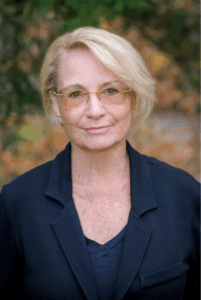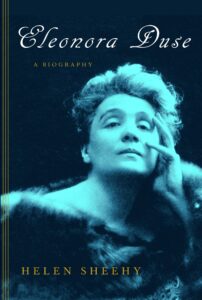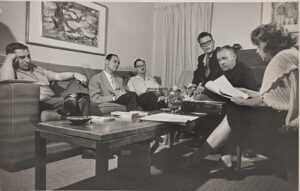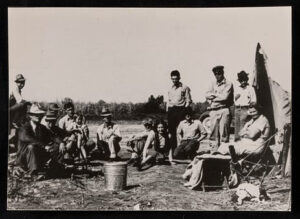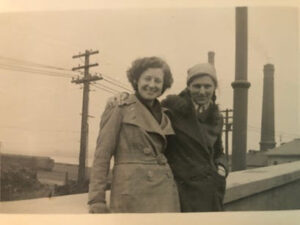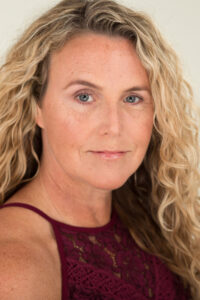Helen Sheehy: Just Willa (a novel)
October 11, 2025 by David
Filed under Fiction, WritersCast
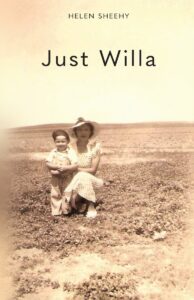 Just Willa (a novel)—Helen Sheehy—Cave Hollow Press—978-2-7342678-3-9—paperback—428 pages—$21.95—April 13, 2025—ebook versions available at varying lower prices
Just Willa (a novel)—Helen Sheehy—Cave Hollow Press—978-2-7342678-3-9—paperback—428 pages—$21.95—April 13, 2025—ebook versions available at varying lower prices
As many Writerscast listeners know, I only interview writers about books I like and enjoyed reading enough to want to share with my listeners. So every episode of this podcast does represent a certain “best of” approach to my reading, since you will never hear about the books I did not love, or could not bring myself to finish.
From among those many books I like, Helen Sheehy’s Just Willa is a special one – this is a flat out just a wonderful novel. It focuses entirely on the story of one woman and her family, Willa Hardesty, and her difficult farm life in dusty, dry Oklahoma. Her story follows seven decades of one woman’s life, a twentieth century family chronicle that focuses on the small struggles of daily life, a difficult husband, the challenges of raising children and the heartbreak that goes with a large family.
Willa is tough because her world requires her to be tough. She is the daughter of a homesteader who somehow manages to be a single mother in an era that provides almost no support, then marries a bootlegging cowboy who is never honest with her. Her seemingly “small” life is really a world that is far greater than it seems, and she lives it with indomitable strength despite all her hardships and struggles to understand who she really is.
Like most great fiction, we come to realize that this novel is entirely true.
I really enjoyed speaking with Helen about her book, her writing process, and her past work as a biographer. I think you will enjoy this conversation, and I hope it might spur you to read Just Willa yourself, and because she is a really fine writer, and this book is autobiographical fiction, perhaps you will be interested in reading her biographies as well.
Helen Sheehy grew up on farms in Oklahoma and Kansas, although she’s lived in Connecticut most of her life. She’s been a dramaturg at Hartford Stage Company and written biographies of theatre pioneers; Margo Jones, Eva Le Gallienne, and Eleonora Duse.
Sheehy taught theatre and English in high schools in Kansas and Connecticut, which was the basis of her first book, a textbook titled All About Theatre. She was Adjunct Professor of Theatre at Southern Connecticut State University for over twenty years. Sheehy has also taught acting and improvisation to inmates in a maximum security prison in Connecticut.
She lives in Hamden, Connecticut. Just Willa is her first novel.
“Helen Sheehy’s masterful prose immerses you in Willa Hardesty’s world with such rich detail and emotional depth that you feel the dust of the Oklahoma plains and the quiet strength it takes to hold a family together. It’s a powerful reminder that even the women who shape our lives can hold truths we only come to understand with time. This book is for anyone who has ever known their mother—or thought they did.”—Michael Sucsy, Emmy-winning writer/director of Grey Gardens
Author website.
Buy the book on Bookshop.org
Podcast: Play in new window | Download
Iris Jamahl Dunkle: Riding Like the Wind: The Life of Sanora Babb
March 3, 2025 by David
Filed under Fiction, Non-Fiction, WritersCast
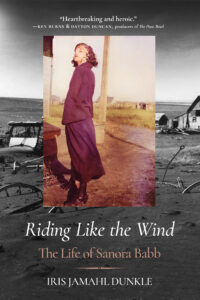 Riding Like the Wind: The Life of Sanora Babb — Iris Jamahl Dunkle — University of California Press — Hardcover — 9780520395442 — 416 pages — $27.95 — October 15, 2024 — ebook versions available at lower prices.
Riding Like the Wind: The Life of Sanora Babb — Iris Jamahl Dunkle — University of California Press — Hardcover — 9780520395442 — 416 pages — $27.95 — October 15, 2024 — ebook versions available at lower prices.Podcast: Play in new window | Download
Sarah Vogel: The Farmer’s Lawyer: The North Dakota Nine and the Fight to Save the Family Farm
April 14, 2022 by David
Filed under Non-Fiction, WritersCast
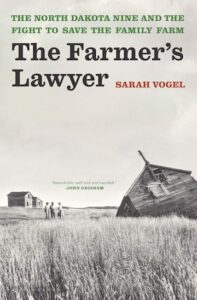 The Farmer’s Lawyer: The North Dakota Nine and the Fight to Save the Family Farm – Sarah Vogel – Bloomsbury – 9781635575262 – 432 pages – hardcover – $28 – ebook edition available at lower prices – November 2, 2021
The Farmer’s Lawyer: The North Dakota Nine and the Fight to Save the Family Farm – Sarah Vogel – Bloomsbury – 9781635575262 – 432 pages – hardcover – $28 – ebook edition available at lower prices – November 2, 2021
Many Americans think of North Dakota and the other prairie states as being conservative culturally and equally unprogressive politically. But that view of these predominantly farming states neglects their long histories of progressive populism that goes back over 100 years. That’s true of North Dakota where the Nonpartisan League was active and strong from the 1920s onward (and into the present, where it still exists as the Democratic NPL — much like the Democratic Farm Labor party in Minnesota that Hubert Humphrey represented.
That history provides the backdrop for Sarah Vogel’s true story in The Farmer’s Lawyer, which tells of a seemingly impossible-to-win legal battle, ironically against the US government agency that was established during the Depression to help family farmers, which by the 1970s was helping to destroy them. At the outset of the Reagan administration (Reagan was helped to be elected, ironically, by the support of midwestern farmers), family farmers of all sizes all across the country were experiencing the worst economic crisis since the Great Depression. Land prices, the backbone of farm economics, had gone down, while farm operating costs were up. and interest rates had skyrocketed. At the same time, in many areas, bad weather severely affected crop output.
Because of policies implemented by the Reagan administration, and growing bureaucracy in the Farmers Home Loan administration, many family farmers were being threatened with foreclosure.
At that time, Sarah Vogel, the daughter of a well known Nonpartisan League supporter and lawyer, was herself a young lawyer and single mother was in the process of leaving Washington, D.C., where she had been working for a government agency. Contacted by some desperate farmers from North Dakota who were on the verge of losing their farms, and inspired by her belief in the importance of family farms to American life, she agreed to represent these struggling clients who couldn’t afford to pay her.
In the midst of her own personal issues, but supported by her family and friends, Vogel brought a national class action lawsuit against the FHLA, which meant she would have to fight against the full force of the Reagan administration’s Department of Justice, in behalf of these family farmers’ Constitutional rights. As a young lawyer who had never privately practiced before, this was her first case!
This book tells the entire years-long saga in incredible detail, brought to life by Sarah Vogel’s writing skill and storytelling prowess. It’s difficult to imagine a true-to-life legal story that has nothing to do with murder or mayhem being a page-turner, but this book will keep you fully engaged throughout. And it will remind you of how difficult it is for “the little guys” to fight against entrenched bureaucracies, especially the Federal government. It is a heroic story for sure, and credits not only Sarah, but her father, and all the farmers she worked with, who would simply never quit, and whose stolidity made such a huge difference, not only to the outcome of their own case, but for many others that followed them.
This is a story about courage, justice, commitment, and belief in oneself. And it is important for us to be reminded that Americans can stand together for the good of all, especially now, when we can agree on virtually nothing. It is an inspiring journey I appreciated learning about. This is a terrific book, and I think we had a terrific conversation as well.
Sarah Vogel is an attorney and former politician whose career has focused on family farmers and ranchers. Vogel was the first woman in U.S. history to be elected as a state commissioner of agriculture. In 2006, the American Agricultural Law Association awarded her its Distinguished Service Award for contributions to the field of agriculture law, and Willie Nelson honored her at Farm Aid’s thirtieth anniversary in 2015 for her service to farmers. She is an advocate for Native American rights and lives in Bismarck, North Dakota.
“Sarah’s story, told in her unique voice, inspires me–and I’m sure it will inspire you–to fight for family farmers.” –Willie Nelson
Author website here.
Buy the book here.

Podcast: Play in new window | Download
Georgia Lowe: The Bonus (a novel)
January 26, 2012 by David
Filed under Fiction, WritersCast
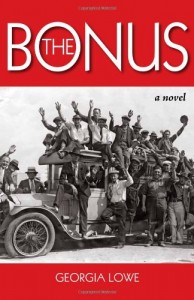 978-0615371450 – Lucky Dime Press – $18.95 – paperback (ebook editions available)
978-0615371450 – Lucky Dime Press – $18.95 – paperback (ebook editions available)
I confess to be particularly fond of Depression era novels and nonfiction. The 1920s and 1930s were incredible periods in American history, so much like the present time it is sometimes strange and even eery. I’m not sure how many readers coming to this novel will know its historical background. In 1932, at the height of the Great Depression, while Hoover was still President, thousands of World War I veterans mobilized to lobby Congress to pass a bill to give them their war service bonuses immediately, to save them from utter poverty and starvation. 2o,000 of them ended up camped in and around Washington, D.C. at the end of their Bonus March.
The political elements of this story sound pretty familiar to anyone who is paying attention to modern political speech. It’s impossible to not think about the Occupy movement as you read this novel, which of course was conceived and written long before that movement’s inception.
Georgia Lowe’s parents were bonus marchers. She grew up hearing their stories about the hot summer of 1932 in Washington, D.C., when General MacArthur, himself also a World War I veteran, brutally dispersed the homeless and destitute marchers, including the families of the vets. Those stories inspired her, but she did not even begin to write fiction until she was much older. She started the novel more than 10 years ago, using elements of her own family’s stories to create the framework of her novel.
I found The Bonus to be a remarkably well written novel that flows beautifully and naturally. I’d characterize it as a “naturalistic” novel, and it feels to me as if it could have been written in the 1930s, with a truly authentic sense of the period, the places and the people of that time. The story focuses on Bonnie and Will, she a struggling actress and he a journalist (and veteran in denial of the pain of his wartime experience), both of them living reasonably well in Hollywood. They each become connected to the Bonus March in different ways, and end up together in Washington, where their personal lives become entwined with the real events surrounding the marchers and their treatment in the capitol. You’re not reading a novel to learn the history, but you will learn it and I think you will feel, as I did, that history is remarkably circular.
I think history has birthed a wonderful novelist. The Lucky Dime website tells us that Georgia is hard at work on two new novels, a prequel to The Bonus entitled An Ordinary Kid and a sequel, The Old Ladies. These are books I will want to read. I can’t resist making a plug for another novel, one that was actually written in the 1930s by a now almost forgotten writer, Thomas Boyd, In Time of Peace, a book I think should be read together with The Bonus to create a really powerful understanding of our own period through the lens of another.
Talking with Georgia was alot of fun for me since I liked her book so much. I hope you will enjoy it as well. And I am not alone in liking this book alot – The Bonus won first place in the highly competitive Mainstream/Literary Fiction category of the Writer’s Digest Self Published Book Awards.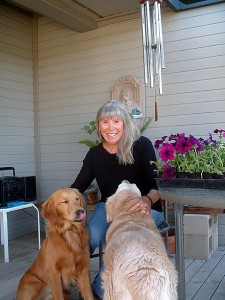
Podcast: Play in new window | Download

